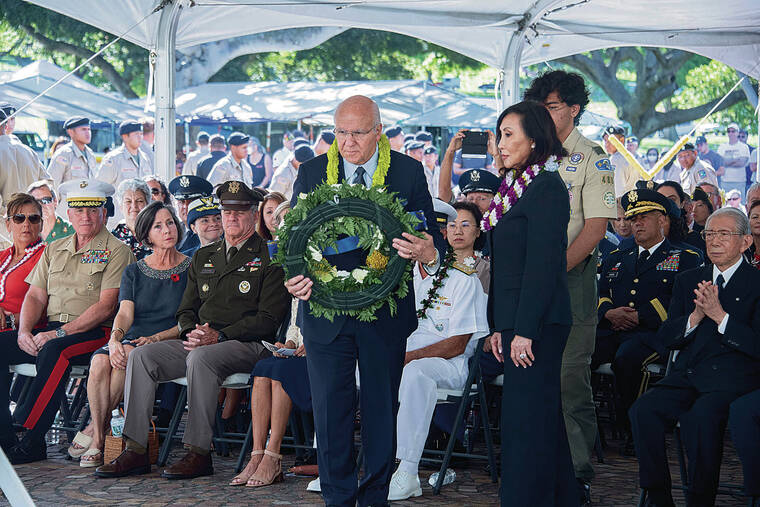City and military officials gathered with local veterans and their families for a Monday morning ceremony at the National Memorial Cemetery of the Pacific in Punchbowl Crater. The Memorial Day service took place amid a tide of simmering geopolitical tensions around the world, something speakers at the ceremony weren’t shy to acknowledge.
“For our service members, the thousands of American flags adorning the graves here today serve as rippling reminders of past sacrifice,” Honolulu Mayor Rick Blangiardi said. “But when you have known loss, when you have witnessed the bravery that we … commemorate today, it is impossible not to also see those flags in the context of the sacrifices that are undoubtedly to come.”
“Our world is in turmoil, as the people of Ukraine can attest,” Blangiardi said. “The threats facing our globe today are not just legitimate, they are a daunting reality — this very place embodies that risk.”
The war in Ukraine, which began in 2014 when Russian forces invaded Ukraine’s eastern Crimean region,
escalated sharply in 2022 when Russian President Vladimir Putin ordered his army to launch an attack on Ukraine’s capital, Kyiv, after a months-long buildup of military forces on Ukraine’s borders. Putin and other Russian officials denied they were gearing up for an invasion, insisting the buildup was a series of routine training exercises. Since then the war has claimed thousands on both sides.
Meanwhile in the Pacific, increasing military activity and a seeming breakdown
of relations and diplomacy are leading to increasing concern that a conflict could break out in the region.
Chinese forces have stepped up their maneuvers around Taiwan — a self-ruled island democracy that Beijing considers a rogue province — and has been locked in a series of territorial and navigation disputes with countries around the region. The U.S. military has been stepping up training exercises across Asia and “freedom of navigation operations” around the Pacific in response. For its part, North Korea has stepped up missile tests, which it says are in response to American
maneuvers.
U.S. officials have insisted that they are working to find diplomatic offramps to avert conflict. In a recognition of the steep human toll of war, Adm. John Aquilino, the U.S. military’s Hawaii-based commander for all forces in the region, asked attendees at the service Monday who have had a family member die while serving in the military to stand up and be
recognized.
“Heroes don’t have to be in uniform,” Aquilino said. “Words cannot adequately express what you must feel on this day. But it’s important to us, to all of us, that we never forget and that you know we honor your family members for their ultimate sacrifice.”
This year’s Memorial Day comes as the state prepares to commemorate the 70th anniversary of the end of the Korean War. More than 400 Hawaii residents died in the war, which broke out when Hawaii was still a territory. The islands suffered among the highest per capita casualties of any state or territory during the conflict.
“I lost my classmates in the war,” said Tommy Tanaka, a Korean War veteran who attended the ceremony. “I’m glad I get to be here to celebrate their life.”
Tanaka was drafted into the Army and wounded in action during a North Korean mortar attack in Kumsong, North Korea, in October 1951 while serving with the 24th Infantry Division. Today he is a member of the Military Order of the Purple Heart, the only veterans organization made up exclusively of veterans wounded in battle.
After the ceremony, he and fellow members of the MOPH paid their respects at the grave of U.S. Sen. Daniel Inouye, who lost his arm while fighting the Nazis in Italy during World War II, and lay a wreath from their
organization.
Tanaka was joined by two fellow veterans who served in the wars in Iraq and Afghanistan. Even as top military brass shift their attention from the Middle East to Europe and the Pacific, U.S. troops continue to deploy to Iraq and Syria to hunt ISIS militants alongside local forces.
“Memorial Day in America acts like a line across time, a line that connects the past, the present and the future,” Aquilino said. “And let there be no doubt, the young men and women who serve today know what they signed up to do.”

